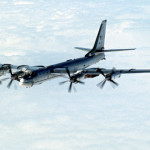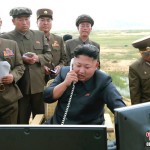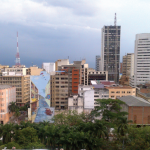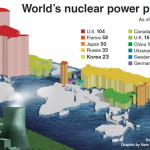- DETERRENCE: Russian Bombers Increase Flights Near U.S. Airspace
- DPRK: Will Indonesia Save the Six Party Talks?
- GOVERNANCE AND CIVIL SOCIETY: South Korea Suggests Northeast Asia Nuclear Safety Group
- CLIMATE CHANGE ADAPTATION: City Resilience Framework: City Resilience Index, Rockefeller Foundation and Arup International Development
 DETERRENCE: Russian Bombers Increase Flights Near U.S. Airspace, Michael Winter, USA Today (7 August 2014)
DETERRENCE: Russian Bombers Increase Flights Near U.S. Airspace, Michael Winter, USA Today (7 August 2014)
Since April 2014, Russian bombers and ASW planes with fighter escorts have flown near US and Canadian northern and west coast airspace, as well as Japan, Korea, and Guam and near NATO allies in Europe, prompting intercepts by US or allied warplanes. US spy planes fly regularly over the Sea of Okhotsk near Russian Far East, and are intercepted by Russian warplanes.
- NORAD scrambled fighters after Russian bombers seen off California coast, Dan Whitcomb, Reuters, June 12, 2014
- Collision Course: Russian jet nearly collides with U.S. surveillance aircraft in ‘reckless’ intercept in Asia, Bill Gertz, Washington Free Beacon, June 3, 2014
- Russian Air Force Boosts Presence in Arctic, RIA Novosti, July 10, 2014
- U.S.: Russian planes flew near California, Guam, in upped activity, David Brunnstrom, Reuters, May 6, 2014
 DPRK: Will Indonesia Save the Six Party Talks? Ankit Panda, The Diplomat (16 August 2014)
DPRK: Will Indonesia Save the Six Party Talks? Ankit Panda, The Diplomat (16 August 2014)
North Korea’s response to military exercises between the US and South Korea were predictable and delivered by the voices of the military and the Foreign Ministry on North Korea’s official press. However, it is still chilling and escalatory to hear North Korea invoke the specter of nuclear war since it is unclear exactly how much of their own statements they believe. North Korea relayed a “concrete proposal” for peace through Indonesia. North Korea’s Foreign Minister returned from a relatively rare diplomatic whirlwind in Southeast Asia in what is likely a “carrot” to the military “stick”. North Korea also started its 4th annual investment fair.
- N. Korea’s new foreign minister leaves his mark on international forum. Asahi Shimbun. (13 August 2014)
- U.S., S. Korean warmongers will have to pay high price for their reckless war drills: spokesman for KPA. (North Korea) Rodong Sinmun. (19 August 2014)
- 4th Rason International Trade Exhibition opens. (North) Korea Central News Agency. (18 August 2014)
GOVERNANCE AND CIVIL SOCIETY: South Korea Suggests Northeast Asia Nuclear Safety Group, Meeyoung Cho, Reuters (15 August 2014)
The ROK President called for the creation of a Northeast Asia nuclear safety consultative group in her speech on Korea’s Liberation Day last week, led by China, Japan and the ROK. The ROK currently has the highest density of nuclear power plants in the world. The administration has also suggested the creation of a ‘peace regime’ to replace the armistice with the DPRK.
- Blue House book calls for ‘peace regime’, Kim Hee-Jin, Joongang Ilbo (14 August 2014)
- South Korea has world’s highest density of nuclear power plants, Lee Keun-young, Hankyoreh (9 August 2014)
 CLIMATE CHANGE ADAPTATION: City Resilience Framework: City Resilience Index, Rockefeller Foundation and Arup International Development (April 2014) [8.17 MB, PDF]
CLIMATE CHANGE ADAPTATION: City Resilience Framework: City Resilience Index, Rockefeller Foundation and Arup International Development (April 2014) [8.17 MB, PDF]
Cities have always faced risks, and many cities that have existed for centuries have demonstrated their resilience in the face of resource shortages, natural hazards, and conflict. In the 21st century, global pressures that play out at a city scale – such as climate change, disease pandemics, economic fluctuations, and terrorism – pose new challenges.
- Making Cities Resilient Report 2012, pp. 110, United Nations Office for Disaster Risk Reduction-UNISDR (2012)
- Building Climate Resilient Cities, Ceres, Boston, USA (2014)
The Nautilus Peace and Security Weekly Report presents articles and full length reports each week in six categories: Austral security, nuclear deterrence, energy security, climate change and security, the DPRK, climate change adaptation and governance and civil society. Our team of contributors carefully select items that highlight the links between these themes and the three regions in which our offices are found—North America, Northeast Asia, and the Austral-Asia region.
- Subscribe to NAPSNet to receive free weekly email reportsEditor
Contributors:
- Deterrence: Peter Hayes
- DPRK: Roger Cavazos
- Governance and Civil Society: Dyana Mardon
- Energy Security: Nikhil Desai
- Climate Change Adaptation: Saleem Janjua


